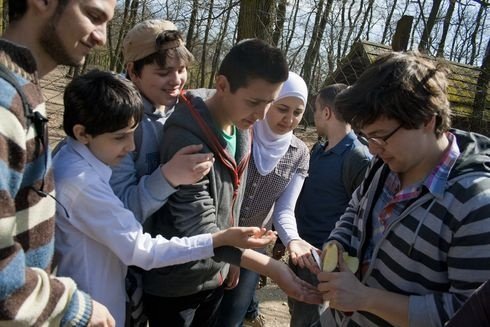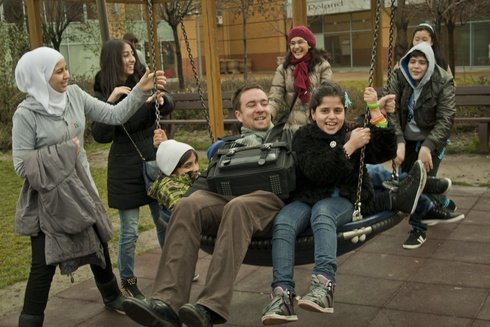Patience and Courage
2014. augusztus 01., péntek“Hungarian people become angry quickly, but there are patient and kind ones too,” said Sally, the 10-year-old who came from Syria with her parents. After only a few years she had learned Hungarian so well that it is not even recognizable that her mother tongue is different. She learns a lot at the study hall of the Refugee Community Center in Budapest with other foreign young people.
“During study hall, I mostly play and study. If somebody doesn’t speak Hungarian, we speak English or Arabic,” says the little girl from the Community Center. The Center is on Váci Street with 150 square-meter classrooms, a community space and a friendly playroom.
“Usually I always have a lesson, but if I don’t have homework or I have free time,” Sally said, “I really like the study hall, because here they explain everything that I don’t understand. Cool people teach me and cool people are here. They know me as if I had been here for 10 years.” She says that patience and courage are the most important things she has learned from her teacher.

One year of help
The study hall has been helping refugees and migrants for more than a year now thanks to an EU competition. Recently they held an open house where professional and volunteer teachers talked about their experiences with the integration and education of foreign young people.
Safe ground
Teacher Zsuzsanna Horváth thinks that cultural differences and the importance of not breaking rules of propriety must be taken into consideration. At the study hall, in addition to teaching, we have to give a safe ground for these young people. This is a place where they can come anytime and where we will have some kind words for them. We want the study hall to be a point from where these people can find their place in an unknown linguistic and cultural atmosphere. I consider it a big success that we have a community here where a Chinese girl and Afghan boy play together, speaking Hungarian.
Hate is something that exists
The teacher says that their children are often banned in their schools. “We try to tell these children that hate is an existing problem. We want to teach our students how to respond when they experience hate. Arabic young people are often called Gypsies, so the problem is not their mother language, they are identified as Gypsies. In these situations, Arabic people have to face the fact that they do the same with Persian and Afghan people. So it is a kind of mirror for them to see how it feels to be on the other side.”

Opened doors
“Study hall means after school, foreign children come to us to study Hungarian and have tutoring lessons,” says Melinda Ottucsák. The leader of the migrant study hall adds that in Hungary their program is unique because it is the only one where migrants can study (though there is another study hall in Debrecen also). “We welcome every non-Hungarian-speaking student who needs Hungarian education or help. Our program has three parts: Hungarian language teaching, tutoring lessons in mathematics, biology, physics and IT and improving social competence. This last focus is perhaps the hardest: don’t break the rules and accept each other.”
Aims
Melinda thinks that the children with aims will learn better and move steadily towards their goals. “For those children who have an uncertain family life, live alone in a dorm or have daily living problems, it is very hard to stay motivated, because they do not have the basic needs. In this situation, we try to supplement the missing food and clothes from donations.”
Colorful bouquet
For the open house, the director of the Reformed Mission Centre, Rev. Erzsébet Magyarné-Balogh, arrived with a “colorful bouquet.” “The bouquet consists of ten kinds of flowers, and if I multiplied the number of petals on every flower, it would not be able to express the diversity in each of you. This bouquet has a message! It says that the life, even if it is short as the stems of cut flowers, it delights us. It has a point. Every human life is a value. Every human life is joy.”
At the refugee mission 13 social workers, teachers and almost 30 volunteer workers help refugees and migrants. Foreigners can get help in language learning, obtaining official documents, housing and finding employment.
Written by Zsuzsa Fekete; translated by Nóra Csobán
Originally published on parokia.hu
Photos: András Kontsek
Contact us
Click here if you are interested in twinning.
Reformed Church in Hungary
Address: H-1146 Budapest, Abonyi utca 21.
PO Box: 1140 Budapest 70, Pf. 5
Email: oikumene@reformatus.hu
English, German and Korean language services in Budapest
Links
Recommended articles
-
Pastoral Letter in the Light of the Pandemic
Bishop Dr. István Szabó sent a pastoral letter of encouragement to the ministers serving in RCH’s congregations, expressing his gratitude for the persistence and creativity of the pastors.
-
RCH Joins in Pope's Call for Prayer
RCH published the call on congregations to join the initiative of Pope Francis, supported by ecumenical organisations, to unite in praying the Lord’s Prayer on Wednesday, 25 March, at noon.
-
English Speaking Worship Services Online
Each Sunday at 11 AM (CET) the St. Columba's Church of Scotland in Budapest, the international community of RCH invites you to join the worpship service on its facebook page.
-
Test of Humanity and Companionship
Reformatus.hu asked Dr. György Velkey, Director General of the Bethesda Children’s Hospital of RCH about the challenges of health care workers and ways of prevention against the pandemic.
-
All Church Events Suspended
In light of the coronavirus the Presidium of RCH requested congregations to suspend all church events with immediate effect. Beside restrictions, it calls for prayer, sobriety and responsibility.











